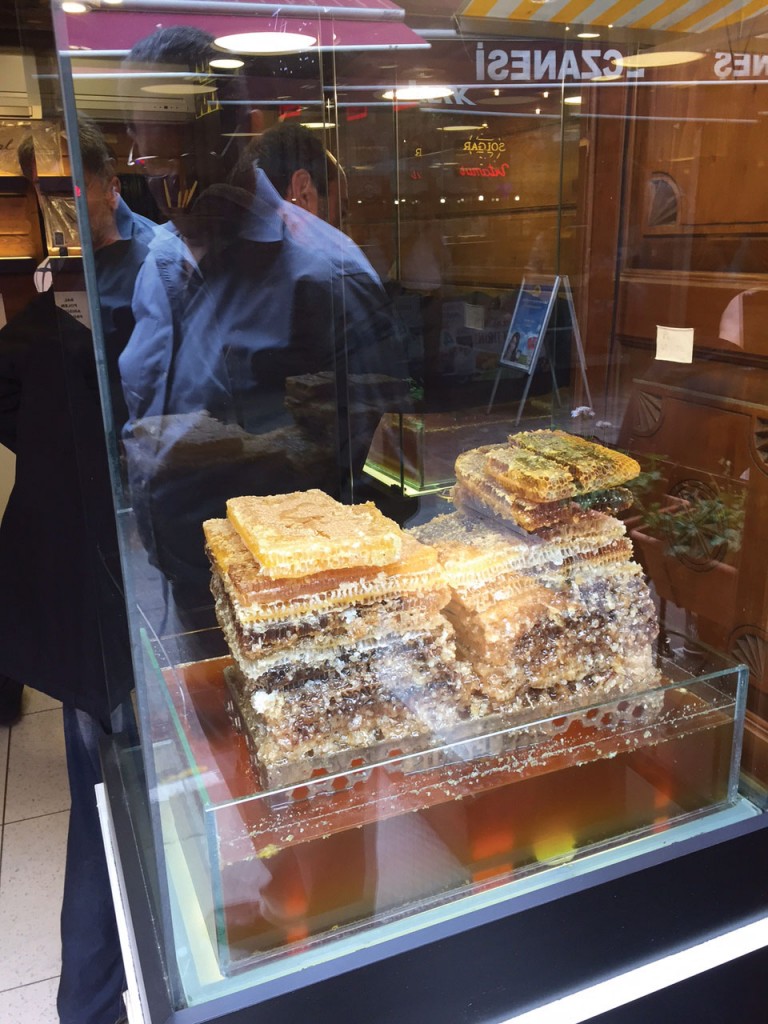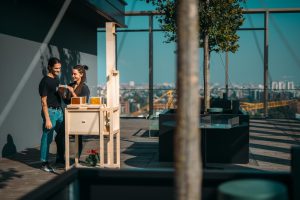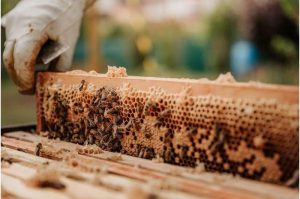by Toni Burnham
Though it too often seems like a source of worry, there’s sometimes a lot to be said for having lots of different people constantly passing near city honey bee colonies. Although traffic in general is a bane of urban life, and the density of people affects many of the plans, decisions, and philosophies we bring to city beekeeping (often with extra sweat and lost sleep), among those passersby are ambassadors from far-away beekeeping communities whom you want to know, and who would like to learn from you. As you consider your own apicultural adventures, remember that they are usually happy to offer you an invitation to visit them in return. Being a city beekeeper is a great conversation starter if you want to be the first to visit!
In my opinion (for what that’s worth), cities tend to attract a greater number of travelers, because of size and the fact that they exist as key crossroads of society on a range of levels. Around here, that includes business people, academics, diplomats, artists, students, politicians, scientists, conference attendees, and tourists, in no particular order (and not a complete list). By connecting across geographic boundaries, we can create valuable, around-the-world communication that builds skills, increases knowledge, strengthens the influence of beekeepers, and encourages us to go on when things get tough. Urban, suburban, or rural, I have found the beekeepers whom we have encountered during travel adventures to be among the most personable, open-hearted, curious and generous folks on the planet.
For example, during the past year my bees have had visitors from England, Germany, and the Philippines, and their minder has visited beekeepers in London, Saint Maarten, York, and Istanbul. Previous years have included eye-opening visits to Israel and France. It’s not a fluke: my friend Joe Bozik has dropped in on beeks in Arizona and Switzerland (talk about contrast!) and Sean McKenzie worked on apicultural extension in Haiti. This stuff widens your eyes, brings new ideas, and adds new friends.
Postcards from the road
Often, seeing operations on the ground in significantly different climates and situations caused me to realize just how limited my experience had been. My first foreign visit was not planned – I simply could not resist finding out what was going on. In Israel, beekeeping turns out to be a key technology for helping the country return land to cultivation and create a stable food supply for all of its residents: an outgrowth of history, politics, and national security. There are migratory colonies on pallets visible from the roads, and we just could not resist finding a beekeeper to ask about it. We found one near the Sea of Galilee, an operation with bees and an education program that welcomed all! They have no true winter, raise silkworms, too, and had no clue about Africanized stock, to my surprise. The country is significantly planted with Eucalyptus as part of land reclamation – something that is also true of parts of France! Israel has very deep urban beekeeping roots: the major Israelite city of Tel Rehov included an apiary with around 100 hives 3,000 years ago!
Much more recently during our first morning in Istanbul, we noticed a complete frame of honey on the breakfast buffet of our hotel: this turned out to be typical! Comb honey seems to be as widely available as extracted, and we found the store of Etabal (www.etabal.com.tr/) a major supplier (in the Kadikoy neighborhood) with rows and rows of frames for sale, and two astonishing tank-like displays of stacked combs from which you can request that the amount you desire to be cut like a slice of cake. They frequently ladle the liquid honey that leaks out over the top. Like here, in Turkey, there are big regional variations: the honey they get from the hotter south is very different from the Black Sea north. My host runs 4,000 colonies, some of which are moved between the two. Turkey has much stricter rules for chemical use in and around beehives, and the emphasis on comb honey is related to this concern for purity.
In Merida, Yucatan by contrast, folks seemed mystified about why I was making such a fuss of being a beekeeper. In the street markets of France and Greece, I had been warmly welcomed when identifying myself (sometimes with jars of honey pressed into my hands!) In that part of Mexico, however, everybody’s aunt seems to have a few hives, and being a beekeeper had roughly the same prestige as declaring that there was a basil plant on my kitchen windowsill.
Divided by a common language: So Much to Learn from Britain
We have family in the UK, and London beekeeping is the reason why I am here to bother you today. I was inspired at the beginning by a BBC Radio program! Besides giving that initial push into beekeeping, London’s beekeepers have also helped us here by organizing themselves many years earlier, managing a large and diverse membership, and tackling many challenges we suspect are yet-to-come. Beekeeping organizations in the UK play a role in linking their individual members from the local level through a national affiliation that includes standards, practices, and certifications across the whole country: when I joined the London Bee Keepers Association (LBKA) I also become a member of the British Bee Keepers Association (and started receiving their FANTASTIC magazine: something any Bee Culture reader would certainly enjoy!)
Over the years I have been welcomed to apiaries at youth development centers, local clubs (which often own their own beeyards and club houses), and “allotments” (community gardens) that include apiaries. Their hive gear is different: the National Hive has different measurements, though it uses frames, and the folks I worked with refer to our typical 10-frame gear as “Langstroth,” not theirs. Those picturesque WBC hives with the slanted sides are viewed as much less practical and popular now (some of the beekeepers in the city had never seen one in person) and some shared that the insulating, double-walled design seemed more like a problem with climate change.
There are other interesting differences in practice and vocabulary that seem to turn up with every visit. For instance, the apiaries I have visited recently are much more likely to use acetic acid for Nosema control than I am used to hearing in the U.S., where frankly it seems to have been mostly viewed as an emergency measure. They are old hands with using oxalic acid for Varroa control, and package bees are a much less common commodity. Beekeepers on the local DC Facebook page are already discussing oxalic acid application with London counterparts. We have also learned that In London, at least, folks are much more likely to make up losses from splits or to purchase nearby nucs, often leveraging club connections and community social media to call out for resources.
The LBKA uses its swarm response and cut-out program to acquire bees for its swarm yard, where they are installed, monitored, and later sold on (or otherwise distributed) to members in need. The peer pressure has been growing for years to buy and breed local bees, and they seem to have avoided small hive beetle and Africanized bees, though they are not sanguine about long term prospects in a globalized world. Even beginners seem to be getting a good grounding in queen rearing and management, both for hardiness and temperament.
I was really surprised to learn of a “June Gap,” or dearth in their nectar flow, considering Britain to be the home of ever-lasting gardens. Recently, at least in the South, beekeepers consider August to be pretty dry as well – much like my home town.
Finally, I turn out to be very nearly useless while assisting in a UK apiary! An inner cover is a “crown board” over there, and what I call frame spacers are known as “castellations!” Spacers are little plastic doohickeys you place over the ends of frames’ top bars that are not “self-spacing” (i.e. if you have the “castellations” you don’t need the “spacers.”) When Mark Patterson of the LBKA called out for a piece of woodenware, it was 50-50 that I would have a clue what to grab for him! Luckily, the crew of Sharon, Carol, Jose, Manny, Asha, and Norma at the Westcott Community Garden were more than patient (and amused).
International Beekeepers Are Looking for You, Too
Beekeepers from other countries have found us at home in a variety of ways and from a range of countries. Being near an existing business or vacation destination, making yourself discoverable (i.e. a community website that says “welcome!” and includes contact info), and also making it known through your North American colleagues and communications that you are up for this kind of thing, bears almost immediate fruit.
It helps to leverage premier “green” locations in your city so you can be found: build relationships and put in some bees! One of my beeyards is at Washington Youth Garden in the National Arboretum, and about 30% of the time during a summer visit, a visiting beekeeper will introduce themselves before I get the outer cover off. With a spare veil, I have stood besides Russians and Salvadoreans (who could not believe how gentle our bees are). Recently, a NYC beekeeper referred his colleague Nils Simon from Berlin to me, and while I had him over at the Arboretum, Joey Duarte from the Philippines came over and introduced himself. Needless to say, we now have standing invitations to do more than inspect frames should we ever venture to each others’ countries! And remember Mark Patterson from the LBKA? Last Fall he came over here and I dragged him to a third grade science class on bee biology: the kids were thrilled to meet an international beekeeper!
How to Meet Beeks Far Afield
Right here at Bee Culture’s web site, there is a “who’s who” list of links to beekeepers in the US and Canada (look under “Find a Local Beekeeper”): look for local associations near your base of operations, and please don’t be shy–try to give some notice, and if folks make time for you, a small gift of honey or homemade soap (especially with a label that identifies your own apiary) is always welcome (well, if customs are ok with it). You can find associations with a simple online search, or by exploring links at national association sites.
If you are a social media participant, many countries have beekeeper interest groups and you can post your interest, as well as area and time of availability, and expect several replies. The larger Facebook groups already include thousands of beekeepers from all over, so they are worth a try, too: if you have a specialization, like organic or TBH beekeeping, those groups are especially interconnected.
In smaller countries and where language is a barrier, I have often asked the staff at our hotel if they know a local beekeeper. That’s what we did in Saint Maarten, where Elvisio Simmon introduced us to a small but sincere and intense beekeeping community. (Tropical paradise or not, it turns out that blooms are not profuse, and woodenware needs to be imported. They give a constant eye to keeping Africanized honey bees out of their colonies, and the Caribbean Bee College makes an immense contribution here and on surrounding island nations.)
Finally, as mentioned above, visiting street markets is another way to meet a local beek as they sell products to the public. I travel with a business card with my name, location, URL, cell number and email address to leave with beekeepers who are doing sales to avoid taking away from their business! You can design and order 500 of these in a few minutes from your home computer for as little as $25 (watch for deals.) It probably needs to be mentioned that setting time parameters, or scheduling a chunk of independent time, is a good idea when traveling with non-beekeepers.
Though this article concentrated on international visits, don’t overlook the fact that North America is an absolutely huge place: while cool overseas adventures often yield the most obvious contrast with what you do at home, just a six-hour drive northeast from my apiary has shown me significant differences in practices, priorities and properties of honey. If a business or family journey lands you at a different altitude or time zone, look up a local association if you have the time.
Because beekeeping can be hard, it is wonderful to reap the reward of community and friendship around the world, and to learn so much more. A small change in climate echoes in different management practices and experiences, some of which, like oxalic for Varroa, are now coming to an apiary near you. Like beekeeping, it brings you more than you know how to expect!
Toni Burnham keeps bees on rooftops and lives in Washington, DC.










